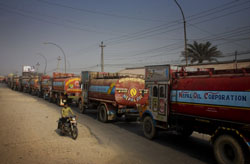|
|
| FACE TO FACE: A Madhesi activist confronts riot police in Birganj last week. |
With the Tarai deal done, the Madhes may get back to normal, but it is not going to be easy.
The United Democratic Madhes Front (UDMF) took its struggle for autonomy to the streets and shut down the plains of Nepal for two weeks. While they had genuine demands, there is evidence that royalist relics from within the country and across the border used the movement to spread anarchy so that elections can't be held.
Most people in the plains agree that elections are not possible in the present state. But they are also curious about how, now that a deal has been reached in Kathmandu, the three-party UDMF alliance prepares for elections in the limited time there is.
|
|
| OIL CARAVAN: Tankers line up near the border to be escorted by the police. |
Till press time on Thursday, people in the Tarai were tuned into their radios waiting for word from Kathmandu. The entire eastern Tarai, parts of Kapilbastu and Nawalparasi, Bhairahawa and Nepalganj have been affected by strikes, street protests and prolonged curfews. People are running out of fuel and food, and frustration levels are high.
While the UDMF has tried to keep things under control, children and youth have often blocked roads, stoned buses, looted hotels and set fire to government offices. Even ambulances, schools and the media have not been spared. Unrest along highway lifelines has triggered crippling shortages of fuel all over the country.
The police have retaliated with live fire and killed at least four people in the past two weeks. Nearly a hundred people have been injured. Manufacturing units in the Biratnagar area have closed down, and this has had the positive impact of reduced load-shedding.
There used to be 1,700 buses plying the eastern section of the Mahendra Highway every day, but this has slowed down to a trickle with Rs 50 million daily losses to transporters. Even air links were hit, with Janakpur suspending flights after threats.
Some 100 factories have closed down in the Birganj-Simara industrial corridor, throwing thousands out of work. Hundreds of thousands of school students across the Tarai haven't been able to attend schools, and many have moved to India or to the hill towns.
There have been deliberate attempts to provoke communal violence in hot spots like Kapilbastu, Bhairahawa and Nepalganj, but quick reaction by civil society and political parties have stopped unrest from spreading.
|
|
| ARMED GUARD: Police escort oil tankers carrying fuel from Raxaul on their way to Kathmandu. |
In Nepalganj, agent provocateurs used SMS to spread false rumours about a 10-year-old Madhesi boy killed by police. Known personalities with past royal connections, local hooligans and criminal elements have been seen with faces covered at the forefront of communally-motivated attacks.
UDMF officials admit there has been some infiltration, but refuse to take responsibility for it. There has also been a show of support for the Madhes movement by extremist groups who want a Hindu monarchy reinstated in Nepal. In Raxaul, the groups managed to block traffic on the border road to Nepal last week. In Nepalganj, UDMF members went across the border to seek protection and brought back a rally the next day shouting anti-Nepal government slogans.
Most political analysts across the Tarai believe elements of the UDMF are trying to prolong the agitation, sabotage talks with the government and convert the movement into violence and anarchy so elections can't be held.
Reporting by Manoj Shrestha in Biratnagar, Shrawankumar Deb in Rajbiraj, Ajit Tiwari in Janakpur, Rabi Dahal in Birganj and Mukesh Pokhrel in Bhairahawa.





